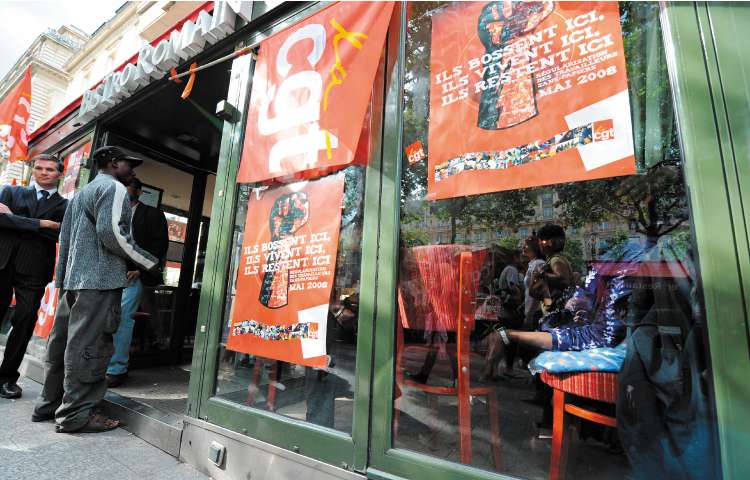Kitchen staff stage sit-in at Champs-Elysées bistro

Your support helps us to tell the story
From reproductive rights to climate change to Big Tech, The Independent is on the ground when the story is developing. Whether it's investigating the financials of Elon Musk's pro-Trump PAC or producing our latest documentary, 'The A Word', which shines a light on the American women fighting for reproductive rights, we know how important it is to parse out the facts from the messaging.
At such a critical moment in US history, we need reporters on the ground. Your donation allows us to keep sending journalists to speak to both sides of the story.
The Independent is trusted by Americans across the entire political spectrum. And unlike many other quality news outlets, we choose not to lock Americans out of our reporting and analysis with paywalls. We believe quality journalism should be available to everyone, paid for by those who can afford it.
Your support makes all the difference.Thirty illegal kitchen workers were occupying a restaurant amid tense scenes in the heart of tourist Paris yesterday.
Red flags and banners flew from the windows of the Bistro Romain on the Avenue des Champs- Elysées, a few yards from the Arc de Triomphe, after a six day sit-in and confrontation between the management and mostly African kitchen staff.
As tourists looked on in astonishment, trade union and management officials accused each other of prolonging the siege and forcing the illegal workers to live in increasingly unhygienic conditions. Among the posters pasted on the windows of the restaurant, one read: "Ici on nous coupe l'eau chaude" (Here, they are depriving us of hot water).
The siege of the Bistro Romain has become the principal flashpoint in a six-day-old revolt by 700 illegal workers in the Paris area, ranging from the chic Paris Golf Country Club in the western suburbs to the office canteen of the sports newspaper, L'Equipe. This follows successful similar revolts in February and April, which forced the French authorities to give temporary work visas to about 1,000 people.
The French trade union federation, the Confédération Générale du Travail (CGT), and an illegal immigrants pressure group, Droits Devant!, have organised the protests to draw attention to what they describe as the "hypocrisy" of the French authorities and many employers.
Scores of restaurants and shops in France employ so-called sans-papiers, or illegal workers, often in relatively responsible jobs, the union claims. At the same time, President Nicolas Sarkozy is pushing ahead with a promised campaign to seek out and expel illegal immigrants.
In many cases, the workers would be entitled to temporary papers if their employers officially declared that their labour was needed, the CGT says.
Scores of workers have been made legal since the renewed protest began last Tuesday. At the Bistro Romain, however, there is a stand-off. The management claims that it was unaware that 30 members of its kitchen staff had no right to work in France. It says that the workers have been asked to leave the building to make an official request for papers.
Eric de Seguins, the restaurant manager, told a television crew on the pavement outside the building yesterday: "We've told them to go and get their papers but the CGT has ordered them not to leave."
"That's not true," interrupted a CGT official, Raymond Chauveau. "You told them that if they left, they could not come back."
Djimo Souaré, one of the workers who are occupying the restaurant, said: "They are trying to make us crack ... they wake us at two in the morning to read out statements."
The protests began in February with a week-long occupation by eight illegal kitchen workers of a fashionable brasserie, La Grande Armée, on the other side of the Arc de Triomphe from the Champs Elysées. The management of the brasserie said that it had no idea that the workers were illegal. Eventually, seven of them were given temporary work papers.
A series of similar protests in restaurants, shops, offices and factories in April resulted in the legalisation of an estimated 1,000 mostly African sans- papiers.
Join our commenting forum
Join thought-provoking conversations, follow other Independent readers and see their replies
Comments